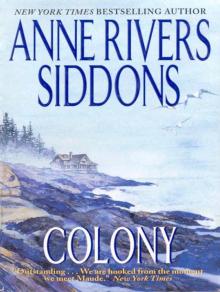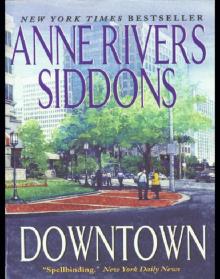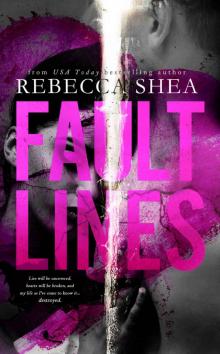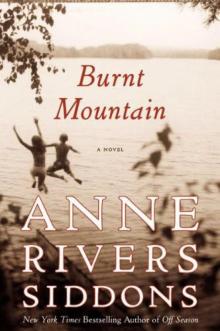- Home
- Anne Rivers Siddons
Burnt Mountain Page 12
Burnt Mountain Read online
Page 12
After what seemed a long time, with only the sound of my grandmother’s creaking rocking chair breaking the silence, she said, “I think I know what you should do. I think I know just where you should go. It’s a very special place. It’s a college, but not like any other college I know about. I agree with you, you do need to get out of this house; I would love to see you go there. It’s in another state, on the top of a mountain. Quite far away.”
She stopped, waiting, I know, for me to reply, to say, What is this place?
But I did not.
“I’ll go there,” I said. “That’s what I want to do. I want to go to college in another state on top of a mountain. I want to go as soon as I can; I want to go this fall. Can you make that happen?”
“Yes,” she said. “I probably can. But don’t you want to hear a little about it? Its name is—”
“I don’t want to hear its name!” I cried. “I just want to go. Does it all have to be so hard?”
“Not in the least,” she said, ringing the little bell that would bring Juanita to her. “Consider it done. Give me a hand here and I’ll go get the ball rolling.”
“Mother…”
“Will be delighted,” she said, and took my hand, and I pulled her out of her rocking chair and together we set off on the journey that would bring me, two weeks later, into the Domain.
The University of the South in Sewanee, Tennessee, crowns the summit of its mountain like a mortarboard or a forage cap, or perhaps a bishop’s mitre, apt similes all. It was founded just after the Civil War expressly to serve the southern diocese of the Episcopal Church in the Christian education of its young gentlemen. It was modeled hopefully after the venerable Anglican churches of England and held together in its early hardscrabble years by many recently unemployed Confederate officers. Many southern bishops blessed it, and not a few came to teach there. Several still do. Widows of Confederate officers and Episcopal clergymen were its first housemothers. It became the indulgent little joke early on that in Sewanee’s case, the holy trinity was God the Father, God the Son, and Gen. Robert E. Lee.
God the Father and God the Son are still manifestly present in the mellow gray dimness of its chapel and seminary, and General Lee’s portrait, flanked by draped Confederate flags and crossed dress sabers, still hangs in Commons. The education presided over by these eminences is unalterably classical liberal arts, and generally first-rate in spite of it, and many undergraduates now are drawn from all over the country and even the world. Very few now come to be molded by God and Gen. Robert E. Lee, for life and service in the vanished world of the Christian Gentleman’s South; in fact, a great many new students come up the Mountain for the first time prepared to jeer. If I had known a thing in the world about the school I would have undoubtedly been one of them.
But in the course of my years there I learned the primary truth of the Domain. Most of those who remain are reluctant to leave. And the young who enter laughing and stay to graduate almost always go out into the world off the Mountain taking with them the swish of academic gowns and a set of values stained at least a bit by that old chivalry. There is enormous power in those old gray stones, cloistered away up on the Mountain. I used to think that the last sound many new graduates heard as they rolled out through the Domain’s stone arch was the triumphant laughter of long-dead bishops and generals.
The sheer, dreaming old beauty on the Mountain is the snare, of course. Those who do not need it often do not stay. A high percentage of freshmen and sophomores do not return. Some flunk out, but many simply bolt back to the rich, comforting stench of the world. Those who do stay somehow find that they need bells in their ears, and plainsong, and countless angels dancing always on the heads of pins.
And, oh, the mossy old stones and the flying dark gowns and the ranked pennons in the chapel looking for all the world like medieval banners, and the slow turn of the seasons in the great hardwood forest, and the mists of autumn and the white snowfall of spring dogwoods; the entire world spread out at one’s feet from the flank of the Steep, and the drunkenness of poetry and mathematics and the illicit flow of good bourbon and the night music of concerts and dances through new green leaves, and the delicately bawdy laughter of young girls and the sheen of their flesh and hair, and the trembling awareness of the cold dew and dawn breaking on hangovers after you have talked all night and sung many songs and perhaps made out by the lake on the Steep. These things are golden barbs in the flesh and will hold long after you have left the Domain. Sewanee is eccentric and elitist and chauvinistic and innocent and arrogant and very, very particular, and it holds its own like a great gray raptor.
It has held a deep-laid part of me for all the years since I left it. How could it not? It has been my future, as well as my past.
* * *
If I said that I was happy in the Domain, I would not be telling the truth. I know that I thought that I was, but for more than three of those four years what I felt was a kind of sweet abstracted comfort, a feeling of well-being that I perceived but did not quite feel. The campus was inordinately beautiful; there was charm in all its seasons. I never ceased noticing that beauty, even if it did not pierce me through, as it well might have before that summer.
How lucky I am to be here, I would think, drifting across campus on a stained-glass fall afternoon, or in a powdery little winter snowfall. And it was true. It would have been awful to have to look at strip malls, exhaust-clogged freeways, the rows of barracks-like housing that haunted so many campuses. I would probably smile as I thought it; once my roommate, a diminutive dumpling of an economics major from New Jersey, said that I reminded her of a character in a bad romantic movie, drifting down University Avenue wrapped in a tan trench coat, my hair flying in a bitter little wind, smiling a goofy secret little smile. I tried to replace the goofy smile with an expression of alert interest, but I did not often succeed. Even I could sometimes feel the corners of my mouth tugging up. But it was mere contentment; I did not think there was any exaltation left in me. That had swirled into the whirlpool that had taken Nick and Sherwood Forest and the sheer delight of being young. It did not seem to matter on the Mountain.
Vice-Chancellor Martinson was a friend of my grandmother’s; he had been best man in her wedding to my grandfather, and she had been on the Mountain many times.
“I always wished women had been allowed to go there when I was college age,” she said. “I wanted Finch to go. But then you came along, and I found the perfect candidate. I only wish I’d thought of it sooner. We could have visited; you could have gone into your freshman year knowing the college. I think it might have made you very happy.”
“I love it just the same,” I said. “It’s made me happy, Grand.”
“Has it, darling? I know it’s been satisfying for you….”
She let it trail off, and I did not reply. Satisfying. Yes, of course. The Mountain had given me all the warmth my heart could hold. My grades were good. I loved my English major and thought my professors empathetic and gifted. Some became quite good friends, in a seemly, facultyish way, and even Dr. and Mrs. Martinson had me to dinner a few times, a fact that did not endear me to my classmates, even if it was only a sweet nod to my grandmother. And when Laureen, my New Jersey dumpling roommate, asked crossly why I never dated, I was able to say, “I do date. I’ve gone to every prom; I went to all the concerts this winter; just last week I went to the movies with—”
“Oh, you know what I mean,” she snapped. “If I looked like you I’d have dated every single male on this mountain by now!”
“There’s still time,” I replied a bit sharply. I did date. I just had not felt any real connection with my dates. My mother was always asking me why I didn’t bring some of my friends home to visit, and I knew she meant young men. My grandmother did not ask, but sometimes she studied me with a slight puzzled frown when my mother launched another bring-a-boy-to-dinner campaign. I took to staying more weekends at school so as not to have to force a reply. Once I said in
exasperation, “Did you send me to Sewanee just to get a husband?”
“Well, of course not, what a thing to say,” she replied indignantly.
“In a pig’s ass,” I said under my breath.
And so on the Mountain, well into my fourth year, I continued my dreamtime walkabout, almost sleepy with comfort, nearly submerged in content.
At the beginning of my last winter quarter, I discovered that I was a quarter short of my English requirements. I could not understand how this had happened; I was, after all, an English major and thought that I had scrupulously kept up with my course requirements. That I could determine there was not an English course on the Mountain that I had not taken. My professors and even the vice-chancellor joined the paper chase, but to no avail. Six months before graduation I lacked the credits to graduate. Undoubtedly, everyone said, it was a clerical error of some sort, but no cleric came forward and the gaping hole in my required courses shone out, as Nellie used to say, “like a crevasse in new snow.”
“There’s not a new English course that would be suitable for you until next fall,” Vice-Chancellor Martinson said. “Maybe we could find you one somewhere off the Mountain that could work for you; I’ll call around this afternoon….”
“No, wait,” my faculty advisor, a sweet brown wren of a woman whose knowledge was vast and vital, despite looking as though she could produce nothing but pies, said suddenly. “Doesn’t Dr. O’Neill’s class on Irish literature and folklore start this quarter?”
“Irish folklore?” I said doubtfully. Of what possible use to me would leprechauns and rainbows and barrels of gold be?
“It would work for your major,” Miss Gerber said. “And who knows? You might actually enjoy it. I would. I’ll call and see if he’s got a space for you.”
She came back into the room smiling.
“One space,” she said. “A student dropped out yesterday. He said if it didn’t suit you to hang on, there would undoubtedly be more classes later.”
“Probably many more,” I groused. Irish folklore indeed. And then I thought, My father would have loved Irish folklore.
And I nodded. “Fine. Irish folklore it is. Who is this Professor O’Neill? Irish, no doubt?”
“As Paddy’s pig,” Dr. Martinson said, grinning. “He’s a great antidote to all the Anglican effluvia dripping off the walls.”
And so the next morning I dashed out into a driving winter rain, late and unable to find my umbrella, and skidded, leaving a puddle with every step, into the classroom where Dr. Aengus O’Neill was dispensing Irish folklore. I sank into a vacant chair on the end of the front row, hoping to be as invisible as possible. I knew it was not working when everyone in the class turned to stare at my soaked raincoat and the red locks of hair plastered to my face. Some of them giggled. The tall man with his back to me, holding an open book and intoning something in an Irish brogue so thick as to seem a parody, did not turn around.
” ‘I am of Ireland,’ ” he said into the overheated air of the classroom. ” ‘And the Holy Land of Ireland, /And time runs on,’ cried she. /’Come out of charity…’ ”
And he turned, looking at me out of the bluest eyes I had ever seen, the blue of the heart of a coal fire. His black hair hung in sort of a comma over one of them, and high on his cheekbones there was a peppering of black freckles. He walked over to me and took my wet face in his hands.
” ‘Come dance with me in Ireland.’ “
His eyes locked on mine and I could feel his breath stirring the damp hair on my forehead.
I began to cry.
Five months later, just into June on the Mountain, I married him in a small outdoor ceremony on the lip of the Steep. We might have married at home, in River House, but my mother did not like Aengus and did not approve of the marriage. We might have married in the chapel, but Aengus did not approve of Anglicans, thinking them bloodless and drowned in ritual. My mother did not attend, but my grandmother did. I did not care about my mother. Grand and Aengus were all I needed on my wedding day, and for many days after.
CHAPTER 9
Angus?” my mother said with a small, contrived frown on her still-perfect brow. “Like the cows?”
Aengus smiled at her, the quick, quirky grin that lit his dark face like a lamp. I had never met anyone who could resist that smile, but my mother did not smile back.
“I wouldn’t be surprised,” he said. “I grew up with more cows than people.”
“And that would be… where?” my mother said, as if his accent could have come from any other place on the earth than where it did.
“That would be Connacht, in the west country of Ireland,” Aengus said. “There are fine towns and cities there now, but we didn’t live in one. We lived on a farm in country so backward that many of us still called it Cruachain. Beautiful it is, but there are no homes of such refinement as this.”
He nodded his black head around the porch of River House, where we were sitting, he and I and Mother and Grand.
“Hmmmmph,” my mother muttered. I heard the tiniest of snickers from Grand. Aengus’s smile widened. I closed my eyes.
I had brought him home to Lytton to meet Mother and Grand at the end of winter quarter. By then Aengus and I were together. I hoped it might be for always. It was hard to tell what Aengus thought, about this, anyway. I never knew anyone who lived so totally in the moment. If I prodded him to think ahead, to make plans for the future, he would laugh and say, ” ‘Sufficient unto the day the evil thereof,’ ” or some other aphorism that meant “Don’t push me.” In this, if not in other ways, he was rather like a child. When I pointed this out to him once, he said, ” ‘Backward, turn backward, O Time in thy flight. Make me a child again, just for tonight.’ ” Aengus was big on aphorisms.
“Why do you want to be a child?” I said. “What were you like as a child?”
“Very much like I am now,” he said.
I thought this might be true. I could almost see him, a grave, dark boy totally absorbed in whatever he was doing, his black head cocked to one side, his lips pursed in a soundless whistle. And then the head raised and the quick white grin. I had seen him so many times. I had also seen him come out of a deep, still study and snatch me up and whirl me around, or burst into a fragment of hideous song that he swore was an authentic Irish folk tune, or do a swift intricate shuffle, also purported to be the original Irish Jig. It was a part of the magic that was Aengus. For Aengus did have magic. I think that when I discovered him I also rediscovered magic.
Grand felt it, too. She adored Aengus, as he did her. But sometimes her eyes were thoughtful as she regarded him, and once she said to me, “Don’t let him go too far into the Irish thing. Don’t let him take you there with him.”
“Grand, it’s one of the things I love most about him,” I protested. “It’s who he is.”
“No,” Grand said. “It’s what he is. He doesn’t know who he is yet. You’re a strong and resilient woman at heart, Thayer. He’ll depend on you to tell him who he is. Otherwise he’ll be gone in a puff of sea mist and moonbeams and you’ll never know him. Keep him in the world with you.”
“I don’t know what you’re talking about.”
“I hope you never do.”
At first, even after the day that he cupped my face in his hands and I cried, I would have little to do with him. I told myself that his pure exuberance, his passion, was off-putting, almost unseemly. He spun such lilting and dazzling stories of gods and poets and heroes and horsemen and rainbows that his class crackled with them like wildfire. They were unlike anything I had ever heard, in a classroom or out. My father had loved the myths of the Norsemen and the Greeks, but he had told me none about the beautiful wild, murderous Celts who rode out of the north adorned in golden torques and took the heads of those they slew in battle and carried them on their saddles. Aengus himself admitted that though the Celtic empire covered a great deal more territory than Ireland, it was there, in his homeland, that he preferred to chronicle them.
“You can find all you like about them in their other haunts. The library’s got it all. But it’s Ireland where they bloomed like stinking roses. More than two million people still speak Gaelic.
“And my God, what a spectacle they must have been, charging into battle in their chariots! They fought naked, and they whipped themselves into a wild bloodlust; the Romans called it furor, the Germans Wut. Their swords were masterpieces of carving; one of them, the Caladbolg, passed on down to King Arthur, who called it Caliburnus, or Excalibur. Yeah, the same one. And the songs and myths! Today I’m going to read you ‘The Tale of Bulls of Cooley.’ For the weekend I want a paper on the Celtic beliefs about death; use the Book of Leinster for background. I’ve got enough Xeroxed copies if you share. You’ll hand them in on Monday.”
Someone would groan, and Aengus would flash the white grin and say, “What better have you got to do of a weekend up here on this goddamn mountaintop?”
Aengus was like a lightning bolt that clove the quiet Mountain. Students followed him everywhere. Some of the faculty did, too. I came to think later that it was partly because I did not that he singled me out. In truth, he frightened me. I felt instinctively that his brush-fire energy could crack the carapace of my content like an eggshell. I skipped his class the next few days but realized that I would have to go back or lose my credits and I could not graduate without them.
The day that I went back he asked me, when class was over, if he could walk me back to my dormitory. By the time we got there I was laughing so hard that I did not realize, for a moment, where we were.
We sat down on a stone bench outside my dormitory and he said, “Now that wasn’t so bad, was it?”
“What wasn’t so bad?”
“Spending ten minutes in my presence outside the classroom.”

 Colony
Colony Nora, Nora
Nora, Nora House Next Door
House Next Door Homeplace
Homeplace Downtown
Downtown Peachtree Road
Peachtree Road Sweetwater Creek
Sweetwater Creek Fault Lines
Fault Lines Low Country
Low Country The Girls of August
The Girls of August Burnt Mountain
Burnt Mountain Islands
Islands